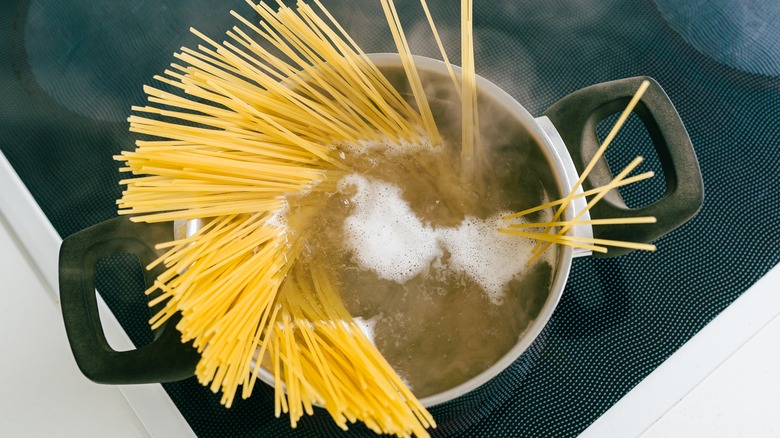Follow This Pasta Timing Rule To Check For Doneness
With anything in cooking, there are rules to follow in order to get the most out of your ingredients. Pasta is no exception. Whether you are making pasta from scratch or enjoying it out of the box, it is one of the most beloved and adaptable ingredients in the entire world. Still, there are often questions surrounding the cooking time you need for the perfect pasta doneness. Fortunately, there is a simple rule that will help.
We should note, first, that this rule only really applies to dried pasta. Fresh pasta is already hydrated, so it really only needs two to three minutes to cook. Dried pasta requires rehydration, and therefore takes longer. Though dried pasta usually comes with timing instructions on the box, you actually need to begin checking it before that recommended time window.
You should begin to check your pasta at least two to three minutes before the timing directions on the package say, and again every minute until the pasta has reached its perfect doneness. You can monitor the texture by using a pair of tongs or a slotted spoon, depending on the pasta shape. By frequently testing it in this way, you train your palate to learn what texture is best.
What is perfect pasta doneness?
Ask any chef or pasta enthusiast what the perfect doneness for pasta is, they will all say the following two words: al dente. It may seem like a cliché, but there is a reason why al dente is truly the perfect pasta doneness. You see, al dente means "to the tooth," which can be a confusing definition for the uninitiated. It sits in the perfect middle ground. Your pasta is neither mush, but not is it too crunchy and undercooked.
Getting pasta al dente means that it is completely cooked, but still retains a slight chew. This doneness does a few things. It maintains a texture that is appealing, but it also allows the pasta to maintain its shape and rigidity in the sauce, which is important for an even coating and flavor.
Though most packaged pasta will give you the timing the company believes will provide an al dente pasta, you should still check it the way we've described. Different stove tops can heat differently or unevenly, causing the pasta to cook faster or slower. So, by checking the pasta before the recommended time, you can get an idea of how your kitchen cooks pasta and when it has reached that perfect doneness. It should be al dente, meaning flexible, chewy, and, above all, cooked.

